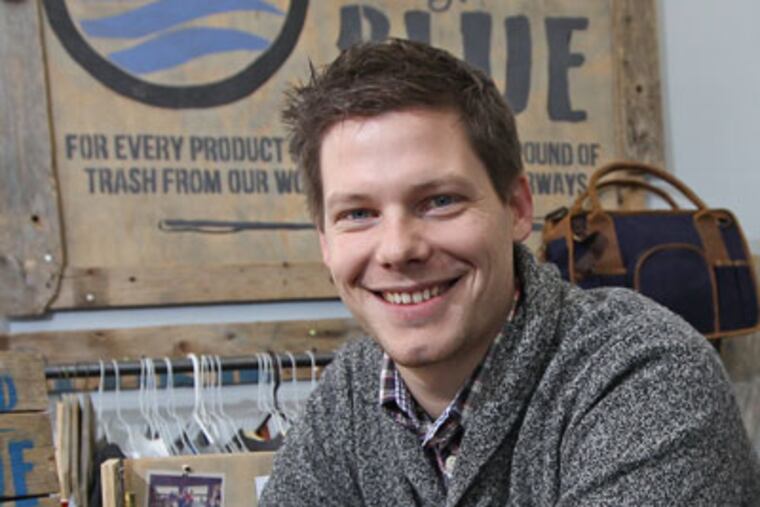He's hoping his business really cleans up
Brian Linton likes to talk trash. In fact, the more trash, the better. Trash is central to the marketing plan for his Center City apparel company, United by Blue. For every T-shirt, bag, or hoodie sold, the company vows to remove one pound of trash from the world's waterways.

Brian Linton likes to talk trash. In fact, the more trash, the better.
Trash is central to the marketing plan for his Center City apparel company, United by Blue. For every T-shirt, bag, or hoodie sold, the company vows to remove one pound of trash from the world's waterways.
Making a donation wasn't good enough, said Linton, 26.
"The brand I created was based on ocean conservation," he said. "It had to have a tangible impact."
Linton's mentor, Jaine Lucas, director of the Temple University Innovation and Entrepreneurship Institute, describes him as a social entrepreneur.
"Social entrepreneurs are people who run businesses that do good for people or the environment," Lucas said. "A traditional business focuses on generating financial returns."
In social entrepreneurship, a business generates financial returns in order to do good, Lucas said: "I tell my students, 'Greed is bad, but profit is good, because profit allows you to do more good.' "
United by Blue primarily sells wholesale to stores, but it also sells direct to consumers through its website (www.unitedbyblue.com). Linton is considering opening a brick-and-mortar store in Philadelphia.
Linton, who grew up in Singapore and Japan, saw his environment shape his entrepreneurial bent in more ways than one.
It gave him the confidence to go global in sourcing his products, and it gave him a love of the ocean and water that now forms the philosophical basis underlying United by Blue.
"The oceans were central to my upbringing," Linton said. "I had an innate fascination with the vastness of the ocean.
"Singapore is an island, and it was surrounded by the water. I always found myself fascinated with coral reefs and the life of the ocean - and how much life there was," he said. "I was always interested in what made the blue parts of the world work."
For exploring, there were scuba diving, kayaking, fishing, and snorkeling on beautiful beaches all around Indonesia, Malaysia, and Thailand.
These days, Linton spends a lot of time cleaning beaches.
The company organizes cleanups, with one member of the nine-member staff devoted full time to doing that and making sure all the logistics are in place, including bags, gloves, and other equipment.
Earlier this month, United by Blue ran a bus from Philadelphia to Staten Island for Hurricane Sandy beach cleanup. In November, 150 United by Blue volunteers worked on Ocean City's beaches.
In October, volunteers picked up 230 pounds of trash from the banks of the Schuylkill at Bartram's Garden.
Linton's entrepreneurial bent started early. As a youngster in Singapore, he raised tropical fish in 30 tanks in his room, selling to pet stores and earning enough money to keep him in fish.
When he was a college freshman, he started importing resort-style jewelry from Asia and selling it in tourist shops in Massachusetts, where he spent his summers.
"It was the most basic business," he said. "You get something at one price, and you sell it at another."
Because he grew up in Singapore, he had friends all over Asia. He arranged for one to buy jewelry in Thailand; Linton sold it here out of the trunk of his car.
"I was strictly wholesale," he said. "I understood that getting into stores was the best way to scale up. You get into a store, and you get access to thousands of sales."
Retailers, he said, wanted "to cut to the chase." They weren't interested in chatting. They wanted to see the merchandise and make a decision.
"They liked the fact that I was young and trying to hustle," he said. "A lot of them saw themselves in me."
When he snagged an order, Linton would open his trunk and fill it on the spot. That summer, he said, he sold $10,000 worth of jewelry, earning a profit of $5,000.
After bouncing around a bit, Linton ended up at Temple, where he became involved with its entrepreneurship program. It gave him the basics he needed to start his business in May 2010.
Linton used his savings, plus credit cards, to finance his business. He also received a $20,000 loan, which he paid back. United by Blue's designers create the merchandise, which is mainly manufactured in Asia.
For Linton, his business' mission and marketing are the same.
Recruiting cleanup volunteers around the country raises awareness for the cause of cleaner water, while building a community of loyal customers.
Linton said they try to make the cleanups fun, offering coffee and prizes for the most comical piece of trash, and posting lots of photos on their website and through social media.
"Our cleanups drive the marketing side of our company," he said. "We don't do much external marketing beyond our cleanups, but the by-product is that we have increased exposure for our brand, and increased sales as a result."
Struggling
for Work
An Inquirer series has been focusing on those who are entering the job market and looking for work. Read more at www.philly.com/phljobs
Follow links to Jane M. Von Bergen's blog, Jobbing, for profiles of more young entrepreneurs.EndText
her workplace blog at www.philly.com/jobbing.